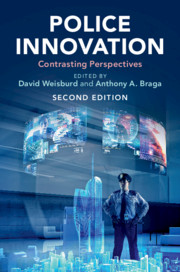Book contents
- Police Innovation
- Police Innovation
- Copyright page
- Contents
- Figures
- Tables
- Notes on Contributors
- Introduction
- Part I Community Policing
- Part II Procedural Justice Policing
- Part III Broken Windows Policing
- Part IV Problem–Oriented Policing
- Part V Pulling Levers (Focused Deterrence) Policing
- Part VI Third–Party Policing
- 11 Advocate
- 12 Critic
- Part VII Hot Spots Policing
- Part VIII Predictive Policing
- Part IX CompStat
- Part X Evidence-Based/ Risk-Focused Policing
- Part XI Technology Policing
- Index
- References
12 - Critic
Third-Party Policing: A Critical View
from Part VI - Third–Party Policing
Published online by Cambridge University Press: 09 August 2019
- Police Innovation
- Police Innovation
- Copyright page
- Contents
- Figures
- Tables
- Notes on Contributors
- Introduction
- Part I Community Policing
- Part II Procedural Justice Policing
- Part III Broken Windows Policing
- Part IV Problem–Oriented Policing
- Part V Pulling Levers (Focused Deterrence) Policing
- Part VI Third–Party Policing
- 11 Advocate
- 12 Critic
- Part VII Hot Spots Policing
- Part VIII Predictive Policing
- Part IX CompStat
- Part X Evidence-Based/ Risk-Focused Policing
- Part XI Technology Policing
- Index
- References
Summary
According to Lorraine Mazerolle and Janet Ransley (2003), “third-party policing” describes police efforts to persuade or to coerce third parties, such as landlords, parents, local government regulators, community organizations, and business owners to take on some responsibility for preventing crime or reducing crime problems. Obviously, this definition seeks to distinguish policing directed at those who are and who might be criminal offenders from policing efforts directed at non-offending “others.” Third-party policing also takes less punitive forms. For example, local governments are increasingly granting groups of businesses and homeowners the right to levy taxes in order to engage in infrastructure investment and surveillance activities in certain areas. Thus, the definition emphasizes the affinities that third-party policing has with other forms of civil regulation and with trends toward privatization of services previously monopolized, or heavily regulated, by state or local governments. Examples of such regulation abound. In an effort to ensure that corporations do not defraud stockholders, regulators place constraints – both civil and criminal – on accountants and lawyers. In an effort to make sure that employers do not violate civil rights laws, legislators have structured statutes so that violators pay plaintiffs’ attorneys fees should the plaintiffs win. In this way, plaintiffs are persuaded to become “private attorneys general” helping public officials to enforce the law. Similarly, the rise of the modern “gig” economy has seen private groups directly competing with government agents in areas as varied as regulating taxi services to space travel.
- Type
- Chapter
- Information
- Police InnovationContrasting Perspectives, pp. 273 - 288Publisher: Cambridge University PressPrint publication year: 2019
References
Primary Sources
Secondary Sources
- 3
- Cited by



